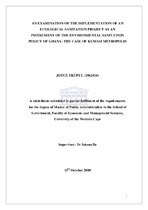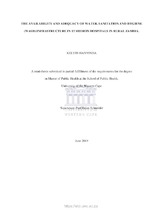An examination of the implementation of an ecological sanitation project as an instrument of the Environmental Sanitation Policy of Ghana: the case of Kumasi Metropolis
Abstract
The generation of large volumes of solid and liquid wastes in urban and periurban areas of Ghana is a big problem for the people and government of Ghana. It contributes to the outbreak of many diseases in the country such as malaria, diarrhoea and typhoid fever. In managing the situation, a new concept called ecological sanitation (ecosan), which focuses on reuse of waste, has been introduced in the country. The objectives of the thesis were to criticise the environmental sanitation policy by analysing its content in relation to policy implementation arrangements, to discuss programmes and projects identified under the policy, to critically examine the implementation of an ecosan project as a way of achieving the goal and objectives by outlining its implementation processes, prospects and challenges, and to make appropriate recommendations. The analysis and discussion of the thesis were based on both primary and secondary data. The primary data, on one hand, were collected on the prospects and challenges that exist in the implementation of ecosan projects from Kumasi metropolis. The secondary data, on the other hand, were from books, journals and websites. From the research analysis, it emerged that the policy allows the implementation of many sanitation projects including ecosan. Secondly, stakeholders see ecosanto be a good approach to reduce waste generation in the country. However, the main challenges that exist in promoting the concept are inadequate financial support, unavailability of implementation guidelines and lack of knowledge about concept details. It is therefore argued that financial support, implementation guidelines and awareness-creation activities should be available in the implementation of ecosan in the metropolis. Government, private organisations, companies and individuals should each contribute their quota in the support and processes.
Collections
Related items
Showing items related by title, author, creator and subject.
-
Exploring factors that influence learners' use of sanitation facilities and personal hygiene practices in a girls' boarding school, Zomba District, Malawi
Kanyerere, Joyce Robertson Ng'oma (University of the Western Cape, 2016)Background: Millennium Development Goal 7 was to ensure environmental sustainability by aiming to halve the proportion of people without sustainable access to basic sanitation and safe drinking water by the year 2015. The ... -
The availability and adequacy of water, sanitation and hygiene (wash) infrastructure in 13 mission hospitals in rural Zambia
Hanyinda, Kelvin (University of the Western Cape, 2019)Background and Rationale The World Health Organization (WHO) has shown that the provision of Water Sanitation and Hygiene (WASH) in Health Care Facilities (HCFs) of many low and middle-income countries is poor. This is ... -
The institutional challenges facing city of Windhoek in the Provision of water and sanitation services: a case study of The Havana informal settlement
Amutenya, Tekla (University of the Western Cape, 2020)This study examined the institutional challenges facing the City of Windhoek in the provision of water supply and sanitation in the Havana Informal Settlement. Like most cities in developing countries, Namibia is faced ...




